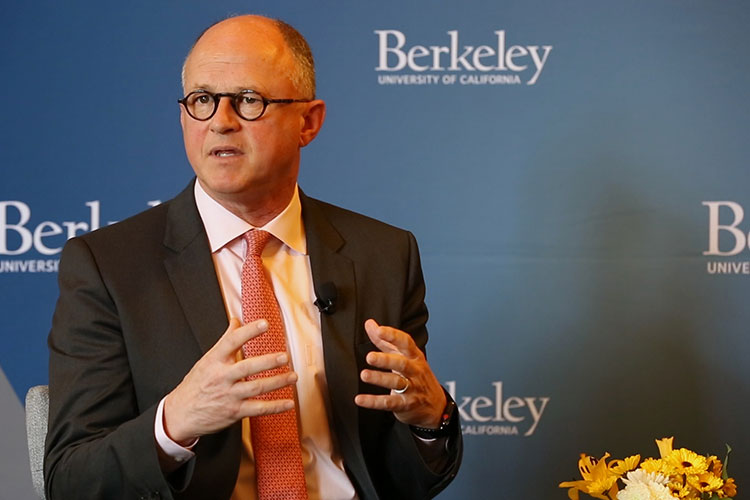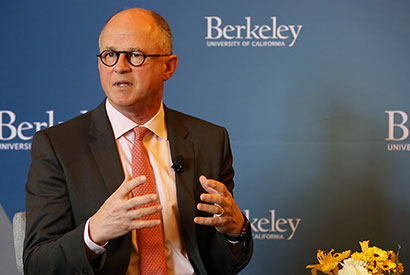VC Fisher: Better policing, sustainability, shared services
Noon audience engages in Q & A with vice chancellor for administration

March 23, 2018
Campus efforts to address everything from policing to the delivery of goods and services to academic units to recycling to inclusivity were part of the latest Campus Conversations, held Thursday at Alumni House with Marc Fisher, vice chancellor for administration. The noon talk was the third in a series connecting the campus community with UC Berkeley leaders.
New to campus last September, Fisher leads a division of more than 1,800 staff members who span human resources, information technology, facilities management, Campus Shared Services, the UC Police Department and other critical functions that support Berkeley’s academic and research mission. He also is partnering with the chancellor and executive vice chancellor and provost to improve the campus’s organizational culture, particularly its commitment to diversity.
Fisher, who has worked for 22 years in the UC system and most recently was vice chancellor for administrative services at UC Santa Barbara, said he remains struck by the “brilliant” staff, faculty and students on the Berkeley campus and that he is honored to be engaged with their “thoughtful, challenging questions. This level of thought is refreshing and interesting to me.”
“The resources (at Berkeley) are challenging,” he added, “but what we have here is adequate to do a great job.”
Answering a series of wide-ranging questions, Fisher first addressed campus policing. It’s a hot topic in his portfolio, especially after the protests last September – right after Fisher had arrived on campus — that erupted around a planned appearance by right-wing commentator Milo Yiannopoulos.

Marc Fisher
Fisher says a new body, the UCPD Community Advisory Board, has been proposed by UC Police Chief Margo Bennet to advise her on how campus police can reflect shared community values as they keeps UC Berkeley safe. The board would grow to include faculty, staff and students.
“Police officers should be proud of what they do to keep us safe, but also be mindful they’re in a community, and that we need policing efforts appropriate and tailored well to that community,” said Fisher. Not everyone arrives on campus having had the same experiences with police, he added, so it’s important for UCPD officers to recognize they’re working in a diverse environment where perceptions of their presence will be varied.
Fisher says he also encouraged the UCPD upon his arrival last fall to increase the number of student-employees in its CSO (community service officer) program. Today, CSO has grown from 19 students last fall to 57. CSO student-officers operate the BearWALK night safety escort service for students, faculty and staff and also are a presence in residence halls and libraries.
“It’s a great way to police the campus. They carry no weapons, tend to be well-received by the student population and can do a lot of good,” Fisher said, adding that in a recent incident, “having a CSO in the building helped resolve the case much quicker than it would have otherwise.”
The increased number of CSO officers also will also mean reduced wait times for their services and the reinstatement of the Hill Patrol fire mitigation program, which began in 1991 as a response to the Oakland Hills firestorm.
Fisher also said campus efforts led by the Office of Sustainability are continuing to progress toward the UC system goal of zero waste by 2020 and carbon neutrality by 2025. He described one effort underway — placing Big Belly bins outside campus buildings so that people can sort their waste into recycling, composting and landfill. About 20 bins have been distributed around campus, and 40 more will be added in 2018. Inside buildings, bins for composting and deskside recycling will be gradually added by 2020.
Fisher added that “huge progress” is being made to upgrade the physical condition of the campus, and that UC Berkeley’s “front door is the most important thing. We need to change that first impression people have here. We need to look at deferred maintenance and do little things to make an older building better.”
Fisher also talked about the campus’s commitment to how it delivers administrative support services to academic clients and how a new regional service delivery model will bring improvements. Schools and colleges will be grouped into six regions, not geographically, but by similar academic disciplines. Each of the eventual five academic and one administrative region will have a regional associate dean, a regional director and its own governance structure.
This regional model evolved from the Campus Shared Services model, which moved the services out of departments, and hopes to establish closer connections between service and the academic units.
“This will be a more integrative model,” said Fisher. “My aspiration is that this will happen quickly, but it will take longer. It’s critical to make it right. We’ll begin to see progress by June.”
Fisher emphasized several times during this talk that he is committed to staff, and to opportunities for them to seek pathways of opportunity to advance their careers in the University of California system. “It’s a big, rich organization filled with opportunities for everyone in this room,” he said, adding that he would be happy to speak with people individually about their career goals.
“Staff are very important to me. I feel hugely responsible for you to have a good experience here,” he said. “You should have fun coming to work. I enjoy coming to work.”
Fisher also encouraged any member of the campus community with ideas about how to improve the campus to email him at [email protected].
“Start by emailing me,” he said. “I like to know what’s going on.”